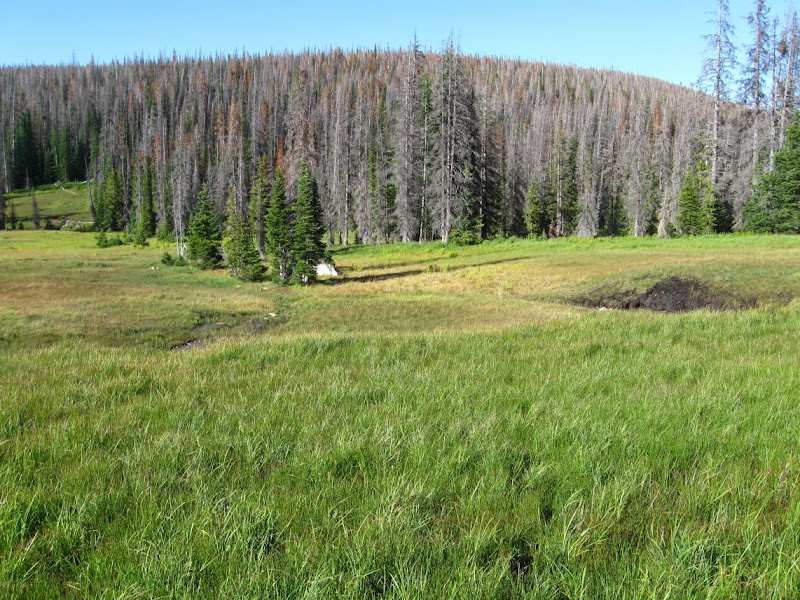"Blue mountains endlessly walking" -- Tao

2009 marks the 100th anniversary of Aldo Leopold's tenure in the southwest, a stay that resulted in the invention of Wilderness, the formulation of a Land Ethic to treat that land as a value in itself and the realization, in "the dying green fire eyes of a wolf" that nonhuman nature might have purpose beyond us. This past year I, too, have been privileged to walk the southwest on the government's dime, but the dying green light I saw was not that of a wolf but of our biosphere. I look down from the mountains and into the future and see shadows, flames, and an end to innocence.
When Leopold encountered the Southwest, he was struck by the contrast of unspoiled wilderness and massive ecological degradation caused by cattle grazing and drought in the 1880's. His ecological awakening engendered a search for the causes of the anthropogenic changes he observed in the beautiful and fragile Southwestern ecosystems. Today, I am confronted by a second wave of anthropogenic changes. Instead of sifting the dust after the event, I am one of the cattle, raising dust, drying rivers. My first reaction was to try to stop or reverse these changes, and I spent two years pulling on that lever, knee deep in mud, with all my strength, determination, stamina and desperation. That era is over now, and this year, with help from my new girlfriend, Alexandra, I have moved past denial and anger to accept the changes that are taking place. My job now is to watch those changes, with the SW on the vanguard, and tell the story of this place, the weather-vane of the world.

My favorite places to hang a hammock are burned in stand-replacement forest fires, the pinyon nuts are harder to come by amongst the blight, and.. While it may be tempting to read the end of the world in these portents, the fact is that the world will go on, weirder and wilder than before. To those who would resist, or rest comfortably, or postpone, I say: Change is Coming. Change is the only constant. What we take to be ordinary is, in fact, extraordinary. But I also came to accept, through my studies of paleoecology and climatology, that no normal ever existed.
I met farmers who are outpacing the state to privatize water, who are resisting privatizing water, who have ranched and lived a way of life for 100 years and whose families probably will for another 100. Ranchers who are distrustful of the government and environmental groups, who love environmental groups but build their houses on the river's active floodplain, who watch tv to fall asleep, who realize the impact of their shopping at walmart to global justice and poverty, and who are, perhaps, more ineluctably tied to thieir cultural practices and our shared economy than they are to the land.
I've looked down on the glowing jewel cities sitting tethered and throbbing from tall mountains and thought about their future and my own. As a human it can be difficult to think of humans as a force of nature like the wind and the sun, but as a scientist the evidence is clear. More people live in large cities and interconnected suburbia than on farms and ranches, and more people are alive today than ever before. Where people live in high concentrations they have completely transformed ecosystems from grasslands or forests into asphalt, houses, and watered trees. To survive from one meal to the next, to make the water run from the faucet, heat, light, all require vast subsidies from the country, which is systematically transformed (though still not to the same degree as the city) to pump services from afar into the city.
Therefore, we create environments that are constantly disturbed, and increasingly homogeneous. Another term for the anthropocene would be the homogocene, when everything is mixed up so much that place ceases to matter. The same species will be found everywhere, the same structures of concrete, metal, plastic, glass, symbols, Virtual.
Disturbance will continue to reset the clock on ecosystems, making oldgrowth ecosystems increasingly rare. Instead, we will become even more accustomed to bland, early-successional weedy eocsystems adapted to high (human) disturbance. I have walked the gradient from unimpacted ecosystems to totally impacted human ecosystems, and the changes are systematic and predictable. Usually, the ecosystem becomes more weedy or barren, and eventually entirely nonfunctional. However, even at the extreme cities can support some species of wildlife, and perform some ecosystem functions, depending on how they are built. Cities are not inherently cancerous on the surface of the earth, although they are metastatizing.
The ecological role of humans, tho, is not as organizers of energy, or even to change functioning ecosystems to nonfunctional ones, but, rather, as "seed dispersers and agents of disturbance (change)". Thus the ecologist diagnoses the humans.









